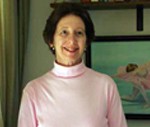By Sheila Orysiek

SAN DIEGO — In setting up and maintaining a library for a Temple, the librarian is faced with a number of choices as to where to place and how to shape the collection on the Holocaust. The following are a few of my thoughts on the matter.
While it is important to have books on the Holocaust in the children’s section, I soon realized that books on such a cataclysmic historical event, read by young children, must be carefully vetted. Thus, each book in the collection was read by a member of the Library Committee. A few were found to be much too graphic.
What does “too graphic” mean? One book gave details about making lamp shades from human skin. Another showed piles of gold teeth, pictures of ovens and more. After much careful thought, as well as consulting with others, it was decided that this kind of specificity was not suitable for young children. In addition, I felt it was important to present a balanced history of the Holocaust: sadness and loss, but also courage and faith. On the one side the horrific inhumanity, but on the other side the bravery, courage and help from many people.
The placement of the adult collection on the Holocaust was carefully considered. The shelves containing these books are in the physical center – where two walls of books come together. I felt this represented a sheltered space, flanked on either side by the rest of Jewish history and activity. I also did not want any of these books to be on the lowest shelf which touches the floor. Pure sentimentality on my part, I admit.
Since the Holocaust was such a seminal event, and so many books have been (and continue to be) written, I find that I have to be vigilant lest this part of Jewish history overwhelm the library. One of the most difficult decisions I continually have to make is whether to add or withdraw a particular book. Each represents a story – a life altering story.
Some of the questions I ask myself before adding a book are: does this book present something unique, new information, a truly different perspective? Before withdrawing a book, I check to see if it has been borrowed, if not – how long it has been unread and if the information is classic or outdated. Even then, shelf space allowing, I try to keep it.
Recently, Don Harrison, founder/publisher of SDJewishWorld.com, asked me to review two books, both set within the timeframe of the Holocaust. The first book dealt with what was happening in Palestine and the brutality of all concerned: British Mandate Authority, Arabs, Jewish underground (Haganah, Irgun, et al); it was a difficult history to digest.
The second book was about the Jewish underground in Kovno, Lithuania, and began with a listing of massacres and horrific tortures wreaked upon the Jewish population by the Lithuanians even before the Nazis arrived. The book seemed to turn bloody in my hands – my psyche was overwhelmed by the slaughter – I couldn’t go on with it. After a lifetime of reading, this is a history with which I am very familiar. If my reading it again could change it, I would condemn myself to reading it for all eternity. But I can’t change it.
Many people, especially those in the seniority of their lives, have expressed to me the same feelings along with a certain guilt at having those feelings. Taking into consideration that shelf space is limited in our Temple library and that these two books very probably will not be borrowed, I decided against adding them.
However, as dreadful as is the history at that time in Palestine presented by the first book, How My Grandmother Prevented a Civil War, by Haggai Segal, (reviewed for SDJW, 11-9-14.) is it not important to make it available?
And then, I saw in the second book, The Story of an Underground: The Resistance of the Jews of Kovno in the Second World War, by Levin and Brown,” a list of the names of all the people who escaped Kovno, hid in the forests, fought with their fists, many falling in the attempt.
Can I turn away from adding this book – if only to honor those names?
*
Orysiek is a freelance writer who focuses on the arts and literature. She also is volunteer librarian for Temple Emanu-El in San Diego. She may be contacted via sheila.orysiek@sdjewishworld.com